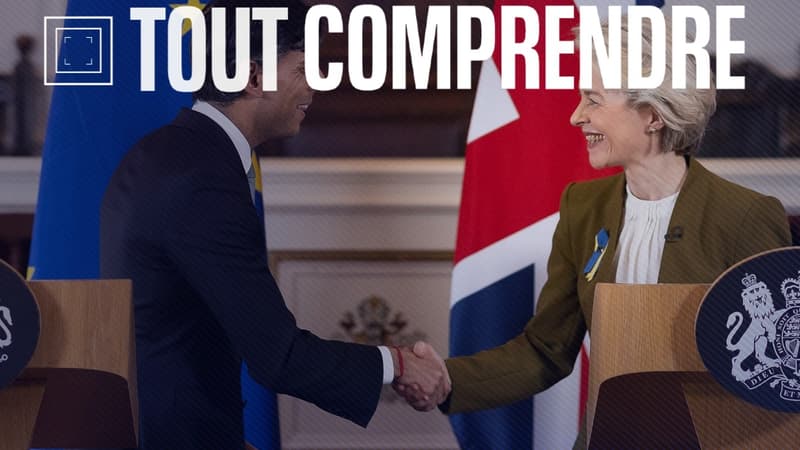Is this time the right one? After months of tension, the European Union and the British government reached a compromise on Monday on post-Brexit arrangements in Northern Ireland, hoping to open “a new chapter” in their relations.
As London and Brussels seemed on the verge of a trade war until recently over this Northern Ireland protocol crisis, British Prime Minister Rishi Sunak and European Commission President Ursula von der Leyen unveiled the deal dubbed ‘ Windsor executive’ at a joint press conference in London. “I think what we agreed to is historic,” said the European leader.
“Most importantly,” he insisted, “is that (the deal) protects the hard-won peace through the 1998 Good Friday Agreement” that ended the conflict between mostly Protestant unionists and mostly Catholic Republicans. , whose 25th anniversary will be celebrated in April. .
• What is the Northern Ireland Protocol?
This is a text negotiated between London and Brussels within the framework of Brexit so as not to weaken the peace concluded in 1998 on the island, by recreating a land border between Northern Ireland, which is part of the United Kingdom, and the Republic of Ireland, a member of the European Union.
Rather than carry out formalities at the only land border between the UK and the EU at the risk of reigniting tensions, it establishes that checks on goods from Britain, across the Irish Sea, are carried out on arrival at North Ireland .
The text effectively keeps Northern Ireland in the EU’s common market and customs union. However, it was never fully implemented due to long grace periods on certain controls, such as non-frozen meat or medicines.
• What were the challenges?
The Northern Irish protocol is blamed for the supply difficulties in Northern Ireland and is presented by the British as a threat to the so-called Good Friday peace agreement, whose 25th anniversary will be celebrated next April, due to the tensions that aroused in the province, unionists fearing in particular to see Northern Ireland, de facto kept within Europe, moving away from the United Kingdom.
It has caused a paralysis of the institutions in Northern Ireland, with the unionists of the Democratic Unionist Party (DUP) hostile to this agreement refusing to unite the local executive with the republicans of Sinn Fein -great winner of the local elections last May-, both controls don’t fall off.
• What changes does the “Windsor Framework” bring?
The agreement reached on Monday should allow for “smooth trade within the UK”, according to Prime Minister Rishi Sunak. “The cumbersome customs bureaucracy will be eliminated,” he insisted. Specifically, products arriving from Great Britain to Northern Ireland to remain there will no longer be subject to the same controls as those destined to be subsequently exported to the Republic of Ireland, that is, to the European Union.
This will apply to commercial exchanges, such as the sending of packages by individuals. Certain changes to the VAT rate or other duties decided by London for the UK, for example on alcohol, will apply to Northern Ireland, while restrictions on the shipping and sale in the province of animals or certain plants. The UK authorities, and no longer the European Medicines Agency, will issue marketing authorizations for medicines.
• What guarantees in terms of sovereignty?
The maintenance of certain European laws and the jurisdiction of the Court of Justice of the European Union in Northern Ireland was one of the main stumbling blocks of the protocol for unionists. The “Windsor Framework” provides for the creation of a “brake” at the disposal of the Parliament of Northern Ireland. If 30 deputies from various parties oppose the application in the province of a new European property and property law, they will be able to call a vote to block it, following the model of an existing provision in the 1998 peace agreement.
This “emergency mechanism”, however, will not take away from the Court of Justice of the European Union “the last word” regarding the rules that govern the single market still in force in the province, insisted the president of the European Commission, Ursula von der Leyen. . In the end, “less than 3%” of European laws will continue to apply in Northern Ireland, London argues.
• What political consequences?
The “Windsor framework” will need to be validated by all EU member states. The Republic of Ireland is in favour, the other 26 should agree.
For his part, Rishi Sunak could become with this agreement the one who adapted Brexit to the realities, but the days to come are going to be delicate. After maintaining the vagueness, he confirmed that the agreement would be submitted to a vote by the deputies, without specifying when. If the Labor opposition has already pledged their support for him, a major revolt within the Conservatives would be a blow to his authority. In recent months, the evictions from power of Boris Johnson and then of Liz Truss have shown the difficulty of governing for a prime minister without majority control.
Within the right, several voices have already judged the Brussels concessions insufficient. Boris Johnson expressed his dissatisfaction with him, which immediately led to his being accused of conspiring to return to power. But the scope of the rebellion is uncertain and the possible wave of departures of ministers opposed to the agreement, once mentioned in the press, seems to have been avoided. And the Conservative Party, already at its lowest point in the polls, can hardly risk a change of leadership for the third time in six months, while the next legislative elections are scheduled for next year.
Source: BFM TV


